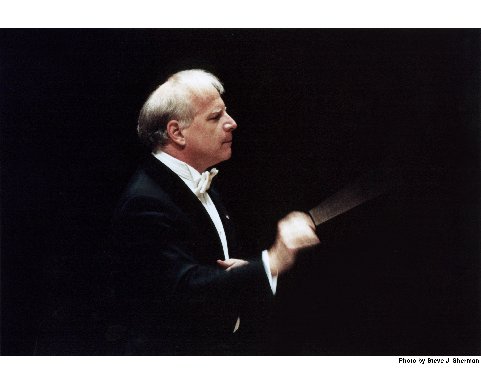

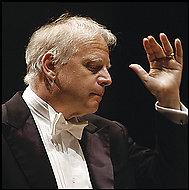 LS: I
said
that many years ago, and
now I'm changing my mind a great
deal. I'm enjoying the operas that
I do, but it's a very limited repertoire that I will do. I'm not
that interested in resurrecting most of the operas that are
deservedly
forgotten. I'm not interested the majority
of the bel canto operas.
LS: I
said
that many years ago, and
now I'm changing my mind a great
deal. I'm enjoying the operas that
I do, but it's a very limited repertoire that I will do. I'm not
that interested in resurrecting most of the operas that are
deservedly
forgotten. I'm not interested the majority
of the bel canto operas.
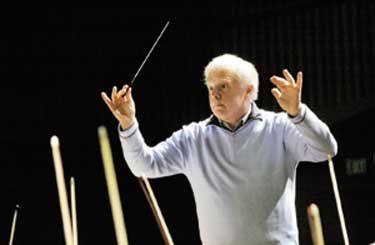 LS:
[Emphatically] Yes!
Somebody somewhere has got to believe in a few
composers and play them a lot, if
they're going to survive. Just the same
as it's very important for Americans to understand
what their
musical heritage is. I
don't understand, for instance,
why we're limited to hearing one or two pieces once in awhile by
composers like MacDowell and Piston and Ruggles,
and Sessions,
I guess, to a certain degree. I think we owe it to ourselves to
look back and see what our own musical traditions are. Then we
commission a new
piece to help build on what the past
is, while looking at the past to make
sure that we understand what it is
we're building on.
LS:
[Emphatically] Yes!
Somebody somewhere has got to believe in a few
composers and play them a lot, if
they're going to survive. Just the same
as it's very important for Americans to understand
what their
musical heritage is. I
don't understand, for instance,
why we're limited to hearing one or two pieces once in awhile by
composers like MacDowell and Piston and Ruggles,
and Sessions,
I guess, to a certain degree. I think we owe it to ourselves to
look back and see what our own musical traditions are. Then we
commission a new
piece to help build on what the past
is, while looking at the past to make
sure that we understand what it is
we're building on.
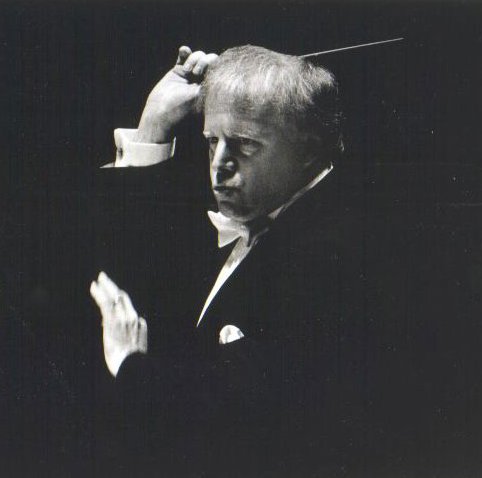 LS: No! I
want people to come to music who really
wanna listen to it, and who want
to get captured in it, not those who are there by chore! Don't
come to music that
I'm involved in unless
you really are interested in it. If
you want to support with your dollars,
that's fine! But if
you're really not interested in
it, just put the dollars there and don't fool us with the pretension
of being an arts lover. And
don't
do it, certainly, just to gain an entrée
into society!
If you don't like it but feel you should be
there, perhaps meet a
friend who does know something about it, and perhaps can guide you
wisely. I
think that may be the biggest problem of
all - people go to things indiscriminately,
without being led gradually into
it. For me, opera comes late because most of the
repertoire I knew as a youngster I deplored! I didn't like it at
all! It's
really been, for me, a very selective process. People
say, "You should listen to this
first, and try to do it in this kind
of order." It was much easier that
way.
LS: No! I
want people to come to music who really
wanna listen to it, and who want
to get captured in it, not those who are there by chore! Don't
come to music that
I'm involved in unless
you really are interested in it. If
you want to support with your dollars,
that's fine! But if
you're really not interested in
it, just put the dollars there and don't fool us with the pretension
of being an arts lover. And
don't
do it, certainly, just to gain an entrée
into society!
If you don't like it but feel you should be
there, perhaps meet a
friend who does know something about it, and perhaps can guide you
wisely. I
think that may be the biggest problem of
all - people go to things indiscriminately,
without being led gradually into
it. For me, opera comes late because most of the
repertoire I knew as a youngster I deplored! I didn't like it at
all! It's
really been, for me, a very selective process. People
say, "You should listen to this
first, and try to do it in this kind
of order." It was much easier that
way.
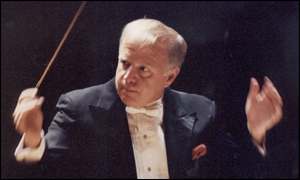 LS: Not so
dissimilar.
Not
really. Leaving aside the text, Salome
is essentially the conflict
between music which is to be in waltz rhythm, and
music which is not to be in waltz rhythm.
It's significant,
for instance, that in all the music of
Jochanaan - of all of it - there is not
one bar in 3/4 time.
It's like it's
the forbidden rhythm, the
waltz. So, in effect,
both Salome and Elektra are the two great examples
of the operatic
tone
poem.
LS: Not so
dissimilar.
Not
really. Leaving aside the text, Salome
is essentially the conflict
between music which is to be in waltz rhythm, and
music which is not to be in waltz rhythm.
It's significant,
for instance, that in all the music of
Jochanaan - of all of it - there is not
one bar in 3/4 time.
It's like it's
the forbidden rhythm, the
waltz. So, in effect,
both Salome and Elektra are the two great examples
of the operatic
tone
poem.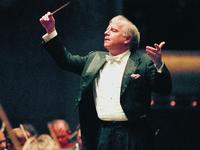 LS:
English.
I
couldn't find a
chorus to learn it in Polish during the amount of time. I
found it very beautiful. I'd always known
Roxana's aria mostly from a
Heifetz transcription,
actually. Then I got
interested and looked at it, and
somebody said, "You know, this is possible for an American
premiere." I
looked
at it and listened to it, and it was really beautiful stuff. It's
a shame it's never been played here, so we did it.
LS:
English.
I
couldn't find a
chorus to learn it in Polish during the amount of time. I
found it very beautiful. I'd always known
Roxana's aria mostly from a
Heifetz transcription,
actually. Then I got
interested and looked at it, and
somebody said, "You know, this is possible for an American
premiere." I
looked
at it and listened to it, and it was really beautiful stuff. It's
a shame it's never been played here, so we did it.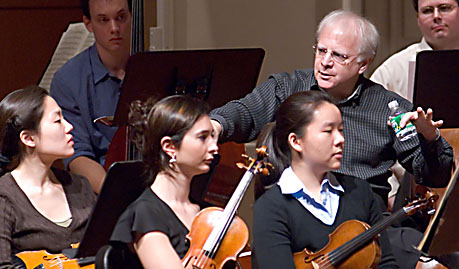 LS: Oh,
no, he didn't encourage me or
my brother to be a musician. We were, in fact, told to get out
of it because it was too
difficult, too demanding, and ultimately
we'd have to make too many sacrifices. He didn't think, as my
mother didn't, that the
sacrifices were worth it,
if you really weren't going to go at
it wholeheartedly, which my
brother and I then proceeded to do!
LS: Oh,
no, he didn't encourage me or
my brother to be a musician. We were, in fact, told to get out
of it because it was too
difficult, too demanding, and ultimately
we'd have to make too many sacrifices. He didn't think, as my
mother didn't, that the
sacrifices were worth it,
if you really weren't going to go at
it wholeheartedly, which my
brother and I then proceeded to do!
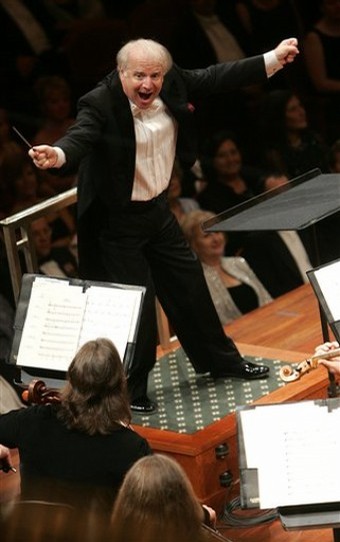 LS:
Orchestral
playing these days is a little more democratic
than it used to be. There was a time when the conductor was the
complete
dictator, virtually having the power and authority to dismiss on the
spot.
If he didn't like what he saw or heard, that player could be relieved
of
the job immediately. These days, that doesn't exist anymore;
there
is much more of a solid base, an orchestral solidarity. The
actual
restrictions against conductors in this country don't condone certain
things
like that. You can be thrown out of the union and you can lose a
job if you get too temperamental.
LS:
Orchestral
playing these days is a little more democratic
than it used to be. There was a time when the conductor was the
complete
dictator, virtually having the power and authority to dismiss on the
spot.
If he didn't like what he saw or heard, that player could be relieved
of
the job immediately. These days, that doesn't exist anymore;
there
is much more of a solid base, an orchestral solidarity. The
actual
restrictions against conductors in this country don't condone certain
things
like that. You can be thrown out of the union and you can lose a
job if you get too temperamental.
* * * * *
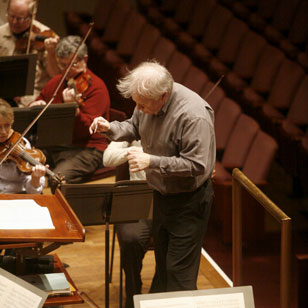 LS: I
put into it
what I think is on the page. I don't
try
to inject my own individualities past what I think is the bounds of
good
taste, which is dictated by what's on the page.
LS: I
put into it
what I think is on the page. I don't
try
to inject my own individualities past what I think is the bounds of
good
taste, which is dictated by what's on the page.
* * * * *
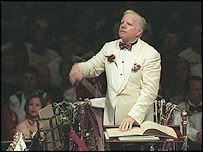 LS:
No. The
style and method of which I use the stick in
the hands is about the same. The only difference is that some
orchestras
play what we call on the beat, and some play afterwards. Where
you
give a downbeat, some orchestras are used to just jumping right in on
that
downbeat. As soon as you come down, boom, they play right with
it.
Other orchestras are used playing just a fraction after the beat comes
down. That's the only kind of adjustment I have to make once in a
while.
LS:
No. The
style and method of which I use the stick in
the hands is about the same. The only difference is that some
orchestras
play what we call on the beat, and some play afterwards. Where
you
give a downbeat, some orchestras are used to just jumping right in on
that
downbeat. As soon as you come down, boom, they play right with
it.
Other orchestras are used playing just a fraction after the beat comes
down. That's the only kind of adjustment I have to make once in a
while.
* * * * *
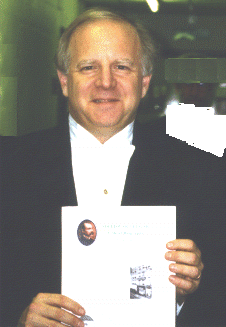 LS: Not much
anymore. When I started out, of course, but
now I'm in a position of being able to pick and choose what I want to
do,
including the soloist and the concerto they'll play. Some people
find that unusual. For instance, I've begun an Elgar cycle for
RCA
in London, and rather than start with one of the more popular works, I
started with an oratorio titled The Kingdom, which is an
extreme
rarity that I find very beautiful. That's some of Elgar's
loveliest
moments; not a great text, but musically quite an extraordinary
work.
I recently recorded the First Symphony for a company called Virgin
Classics
which is just beginning in Europe and will debut in the United States
in
October. I find I like exploring some of the lesser music that I
enjoy, and at the same time recording and presenting some of the more
familiar
works. We have recordings of Brahms that are out. We have
recordings
of Prokofiev; we're recording ballets of Tchaikovsky, we' re recording
works of Schubert. So I'm quite content with the variety that's
on
disc.
LS: Not much
anymore. When I started out, of course, but
now I'm in a position of being able to pick and choose what I want to
do,
including the soloist and the concerto they'll play. Some people
find that unusual. For instance, I've begun an Elgar cycle for
RCA
in London, and rather than start with one of the more popular works, I
started with an oratorio titled The Kingdom, which is an
extreme
rarity that I find very beautiful. That's some of Elgar's
loveliest
moments; not a great text, but musically quite an extraordinary
work.
I recently recorded the First Symphony for a company called Virgin
Classics
which is just beginning in Europe and will debut in the United States
in
October. I find I like exploring some of the lesser music that I
enjoy, and at the same time recording and presenting some of the more
familiar
works. We have recordings of Brahms that are out. We have
recordings
of Prokofiev; we're recording ballets of Tchaikovsky, we' re recording
works of Schubert. So I'm quite content with the variety that's
on
disc.
* * * * *
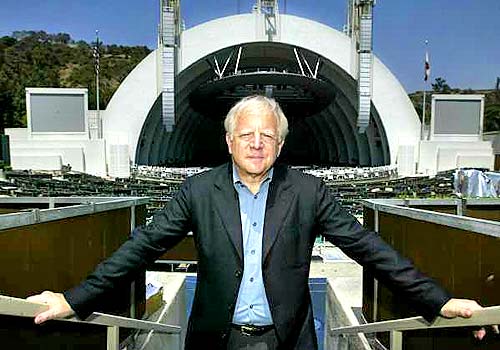 LS: I play
piano
quite frequently, especially in the summer
festival
in Minneapolis. So I'm still actively involved as a
performer.
I think that a conductor has to continue to keep the hands-on
experience
going. It's really not very difficult just to get up there and
wave
your arms with a stick in it. A baton doesn't make any audible
noise
to the orchestra or the audience, but's a whole different matter when
you
have to put your own hands and fingers down on an instrument and
produce
your own sound. So I try to keep up with that just a bit. I
don't aspire to be a great pianist or a great instrumental performer,
but
I think that the fact that I do sit down and do that once in a while
gives
me a right to be able to converse with other musicians as closer to an
equal than if I did not play any instrument at all.
LS: I play
piano
quite frequently, especially in the summer
festival
in Minneapolis. So I'm still actively involved as a
performer.
I think that a conductor has to continue to keep the hands-on
experience
going. It's really not very difficult just to get up there and
wave
your arms with a stick in it. A baton doesn't make any audible
noise
to the orchestra or the audience, but's a whole different matter when
you
have to put your own hands and fingers down on an instrument and
produce
your own sound. So I try to keep up with that just a bit. I
don't aspire to be a great pianist or a great instrumental performer,
but
I think that the fact that I do sit down and do that once in a while
gives
me a right to be able to converse with other musicians as closer to an
equal than if I did not play any instrument at all.
| [From the
program booklet of the
Kennedy Center, February, 2008] Music Director Leonard Slatkin is internationally recognized as a celebrated musician and champion of American music and musicians. Now in his 12th season with the NSO, he is lauded for leading the Orchestra on triumphant tours through Europe, Asia and the US, as well as nationally acclaimed festivals, broadcasts, and recordings. His imaginative programming and interpretations of a vast range of repertoire have been praised and awarded nationally and internationally. Mr. Slatkin and the Orchestra have been celebrated by the White House for their advocacy of America's artistic heritage, and Mr. Slatkin has been recognized with numerous honors and awards, including the National Medal of the Arts and the American Symphony Orchestra League's Gold Baton for service to American music. Mr. Slatkin has regularly appeared over the last two decades with the world's major orchestras and opera companies, including the New York and Berlin Philharmonics, the Chicago Symphony, and Concertgebouw Orchestra, as well as the Metropolitan Opera and Vienna State Opera. Mr. Slatkin is Principal Guest Conductor of London's Royal Philharmonic Orchestra, and beginning with the 2008 season, the Pittsburgh Symphony Orchestra. At the same time he will become Music Director of the Detroit Symphony Orchestra. He is Conductor Laureate of the Saint Louis Symphony and the Music Advisor to the Nashville Symphony, and has just completed a very successful three-year term as Principal Guest Conductor of the Los Angeles Philharmonic at the Hollywood Bowl. In addition to his conducting appearances, Mr. Slatkin is a frequent host of musical broadcasts, which include the BBC, lending his broad knowledge and expertise. Mr. Slatkin's extensive discography of more than 100 recordings have been recognized with nine Grammy Awards and more than 60 Grammy nominations. Mr. Slatkin is a well-known advocate for arts education in America. He works with students of all ages, both in schools and at the Kennedy Center. This year he begins a relationship with Indiana University as the Arthur R. Metz Foundation Conductor at the Jacobs School of Music, as well as a relationship with American University as its Distinguished Artist in Residence. He holds honorary doctorate degrees from educational institutions such as Juilliard, Washington University, University of Maryland, St. Louis Conservatory, and Shenandoah Conservatory. Mr. Slatkin is the founder and director of the National Conducting Institute, a groundbreaking program established in 2000 to prepare gifted conductors for work with major orchestras. He is an ongoing champion of both old and new music, which has placed him at the forefront of the nation's musical leaders. For more information on Mr. Slatkin, please visit www.leonardslatkin.com. |